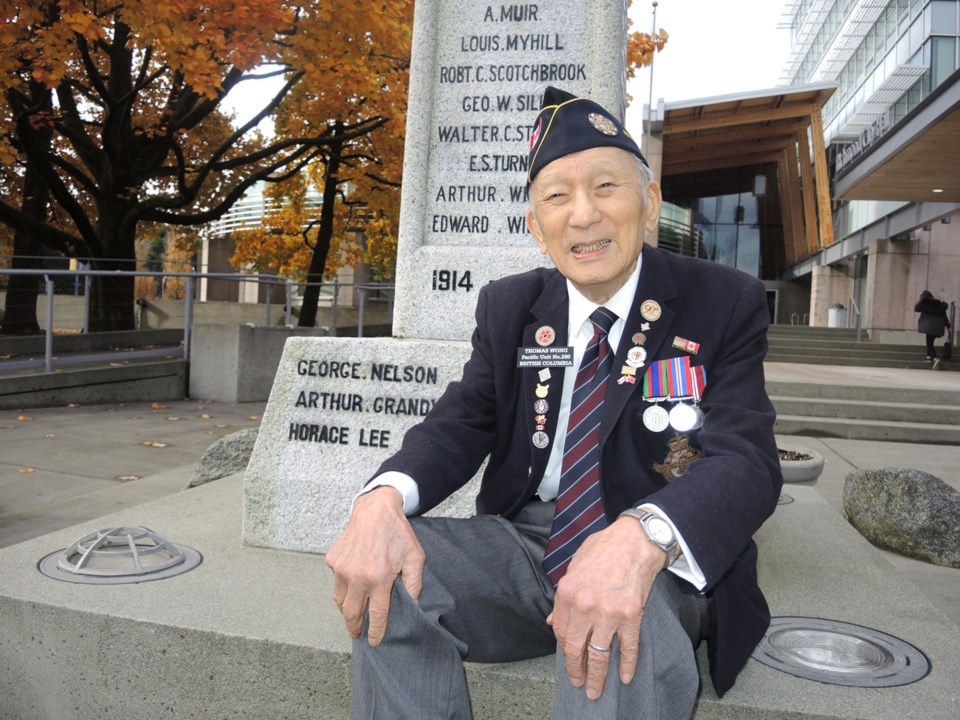One of Richmond’s most celebrated war veterans, Tommy Wong, has died, age 101.
Richmond resident Wong, who was the first person of Chinese-Canadian ethnicity in the Royal Canadian Air Force (RCAF), passed away Sunday at Richmond Hospital.
His close friend and fellow RCAF veteran, Richmond’s George Ing, said Canadian-born Wong was a quiet, intelligent and private man, but who also had a “zest for life.”
“He was very, very proud of his military service,” said Ing, a member with Wong of the Chinese-Canadian veteran group Pacific Unit 280, on Tuesday.
In 2017, Wong was one of five Chinese-Canadian veterans granted “The Glory of Chinese” award by the Richmond-based Canadian Community Service Association (CCSA), in recognition of their contribution towards winning full citizenship for all Chinese-Canadians.
To mark Remembrance Day in 2016, the News featured Wong and told the story of how he put a lifetime of discrimination aside to serve Canada in its hour of need during the Second World War.
Prior to enlisting, the Victoria native and building contractor had been rejected by the RCAF on the basis of his ethnicity six days after the war started in 1939.
Other divisions of the Canadian armed forces, such as the army, had allowed citizens of Chinese ethnicity, but not the air force, which is where Wong’s heart lay.
However, more than two years later, on the fateful day of Dec. 7, 1941, when the Japanese decided to attack Pearl Harbor, his life changed forever.
Wong received a letter from the very same recruiting office which had snubbed his offer of help two years previous, requesting his presence in Vancouver as soon as possible.
“(The RCAF), all of a sudden, wanted me,” a smiling Wong told the News in 2016.
Wong, who called Richmond home for most of his life, recalled feeling “real good,” at the time, despite being sent packing earlier due to his Asian heritage.
“They asked if I wanted to be air crew or ground crew. My heart was strictly in flying and also, this would be a chance to help bomb the Japanese; so I was well motivated,” he said at the time, when asked how he felt about only being called up due to the attack on Pearl Harbor.
Wong graduated first class in his training and was then sent to an air base in Calgary, where he spent a further year learning his new trade and quickly rose through the ranks to sergeant and then to an inspector in the Aeronautical Inspection Detachment (AID).
While training as an aircraft inspector, Wong made sure the likes of Kittyhawk and Spitfire fighter planes and Lancaster bombers were 100 per cent ready to fly.
Wong spent a chunk of the war stationed in Vancouver and eventually married his now late wife, Juney Lim, before opening a woodwork shop inside a theatre in Vancouver’s Chinatown.
As a result of their sacrifice in the Second World War, Chinese-Canadians were finally able to claim the opportunities and rights afforded other Canadians.
They were offered citizenship and the right to vote. Those privileges led, in turn, to membership in professional societies such as law, engineering and medicine — important careers previously closed to Asians.
Wong, who lived in a condo on Minoru Boulevard, is survived by his second wife, a sister and four children.
Details of a memorial service in his honour are still being worked on.



